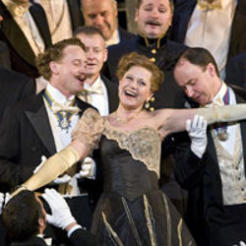The English National Opera has had its Arts Council funding cut by nearly a third to £12.4m a year in the wake of an examination of the opera company which concluded that it had struggled to meet box-office targets and needed “radical change”.
The ENO is one of the biggest losers in the new three-year settlement announced by the Arts Council yesterday. Its £5m annual cut comes after the Arts Council published an analysis of the UK's seven major ballet and opera companies last year and found the ENO needed some new ideas to assure its long-term sustainability.
The analysis did acknowledge, though, that the ENO had already begun to shape a new business model. By the end of the last financial year its fortunes had already begun to turn around - paid attendance was up 11 per cent on the previous year and average takings per performance had risen 13 per cent. A small surplus was achieved.
As well as the £12.4m core funding, the ENO will receive up to £7.6m transition funding - which is what it applied for.
The Barbican and the Horniman Museum will also swallow large cuts.
The Royal Opera House, by contrast, will take a hit of just £800,000, leaving a three-year deal of £24.77m per year. English National Ballet sees its grant unchanged at £6.2m a year.
The ENO has been struggling to meet its box-office targets for a while now, and posted operating losses in the three years before last year. John Berry, the ENO’s artistic director, said the company had been working with the Arts Council to devise a new business plan to ensure its long-term stability. “We announced a number of key elements in that new business plan in April – specifically our approach to balancing commercial and public investment – and we are delighted that the Arts Council is supporting our application with the funding announced today.”
Across the board, three-quarters of organisations currently funded by the Arts Council will see their settlement continue unchanged, resulting in a real-terms cut of just under 5 per cent by the end of the three-year period.
Some 58 organisations will lose funding altogether but 46 previously unfunded groups will join the funded portfolio.
The National Theatre, Southbank Centre and Royal Shakespeare Company will see their grants reduce by 6.7 per cent.
The Arts Council has been forced to prioritise its spending because the government has cut its support to the funder by 36 per cent since 2010. Some £69m of National Lottery cash will be used to supplement the Arts Council settlement, to be used to support touring and work with children and young people.
Overall, Arts Council strategic funding will reduce, from £153m this financial year to £104m in 2015/16, while grants for the arts will grow from £63m in 2012-2015 to £70m for 2015-2018.
In its guidance to applicants, the Arts Council added that any change in its own funding settlement beyond the general election may affect the amounts it can pass on to grantees.
It said: “We have made prudent assumptions about future levels of grant-in-aid and Lottery revenue, but applicants should be aware that if offered funding, the amount for 2016/17 and 2017/18 may have to be varied when we receive our settlement for these two years.”









